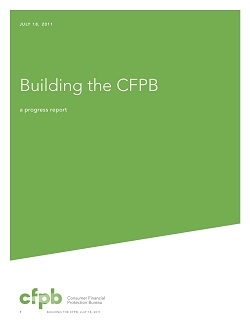Yesterday, we began operation of what will be the largest function within the CFPB: Supervision. As part of this effort, Special Advisor to the Secretary of the Treasury Elizabeth Warren and Assistant Director for Bank Supervision Steve Antonakes signed and sent introductory letters to the CEOs of over 170 financial institutions that are subject to CFPB Supervision. These are depository institutions with over $10 billion in assets and their depository affiliates.

Professor Elizabeth Warren and Assistant Director for Large Bank Supervision Steve Antonakes sign introductory letters to the CEOs of over 170 financial institutions that are subject to CFPB Supervision.
Supervision will serve as consumers’ eyes in financial institutions by assessing whether the institutions are complying with various federal consumer protection laws. If they are not, we will work with other CFPB teams to determine what should be done. In addition to requiring the company to change its practices so they comply with the law, we might also require improved employee training, implementation of better policies and procedures or quality controls, and in more serious cases, monetary compensation to consumers. Our supervision will have a simple goal: to prevent harm to consumers from unlawful financial practices and ensure that markets for consumer financial products and services are fair, transparent, and competitive.
To accomplish this, we are assembling a diverse and talented team of several hundred examiners. They will be based in four satellite offices in Chicago, New York, San Francisco, and Washington, D.C. These examiners will serve as the proverbial “boots on the ground” for consumers. They will travel to the largest banks, to mortgage lenders and servicers, and to companies in other consumer financial markets. They will kick the tires by asking questions, observing activities, and collecting data. For example, examiners will look at transaction records or observe call centers. These activities enable us to assess institutions’ compliance with the law and the quality of their internal processes for ensuring compliance.
Our examination process will strive for transparency, efficiency, and fairness. It will not be about “gotcha.” We will communicate with institutions throughout the examination cycle. In most instances, institutions will be advised of upcoming examinations well in advance of the start of our examinations. We will keep the institution informed of the examination’s status and findings during the course of our review. We will meet with management to discuss our findings and conclusions prior to finalizing our exam report. We will work constructively with institutions to address compliance risks and issues as well as to strengthen their compliance programs and practices. And we will keep the public informed of supervision activities through aggregate quarterly reports – while maintaining the confidentiality of supervisory information.
We expect this communication to go both ways. Our examination process will improve continuously, based not only on input from examiners in the field, but also on feedback from the organizations we supervise and other interested parties.
The CFPB will coordinate its supervision efforts with other federal and state regulators. They will continue to have important responsibilities for overseeing the safety and soundness of depository institutions, as well as an important continuing role in consumer protection. We understand and place a very high value on their primary mission of ensuring that banks, thrifts, and credit unions are run in a safe and sound manner so they remain trusted and reliable deposit holders. Indeed, many examiners will join the CFPB from safety and soundness-focused regulators. We will also share information with these regulators and will coordinate exams with them. This understanding, appreciation, and coordination will help to ensure that the CFPB carries out its consumer-centered mission in a manner that is sensitive to safety and soundness considerations and minimizes regulatory duplication.
Examiners will also work closely with colleagues throughout the CFPB. When consumers submit complaints to the CFPB, the Consumer Response team can relay to examiners any trends those complaints reveal. Our offices focused on the needs of Older Americans, Students, Military Servicemembers, and underserved consumers and communities will flag issues for our examiners to review. Economists in our Research group and analysts in our Markets offices will communicate their latest findings to better inform our field work. And, generally as a last resort, examiners will coordinate and work closely with CFPB’s Enforcement staff to implement appropriate enforcement actions to address violations of law that harm consumers.
In the coming weeks, we will communicate more details about our supervision policies and procedures. If you have questions you would like us to consider, please leave them in the comment section below. We look forward to hearing from you.
Peggy Twohig is the Assistant Director for Nonbank Supervision. Prior to her work at the CFPB, Ms. Twohig was Director of the Office of Consumer Protection at the Department of the Treasury, where she worked on the proposal to create a new consumer agency as part of financial regulatory reform. Immediately before joining Treasury, Ms. Twohig served as Associate Director of the Division of Financial Practices at the Federal Trade Commission, focusing on enforcement and policy issues related to consumer financial services.
Steven Antonakes is the Assistant Director for Large Bank Supervision. He was previously appointed by successive governors to serve as the Commissioner of Banks for the Commonwealth of Massachusetts. In that capacity, he supervised over 250 state-chartered banks and credit unions and over 5,000 non-bank entities, oversaw the development and implementation of the Nationwide Mortgage Licensing System, and became the first state voting member of the Federal Financial Institutions Examination Council.



